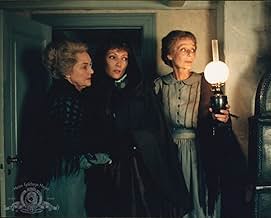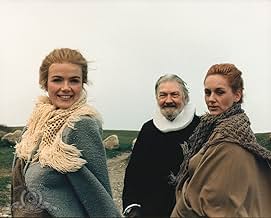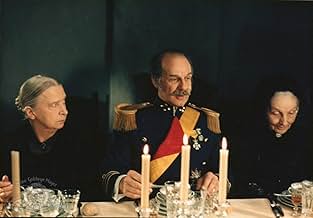IMDb-BEWERTUNG
7,8/10
23.191
IHRE BEWERTUNG
Eine strenge Religionsgemeinschaft in einem dänischen Dorf nimmt einen französischen Flüchtling aus dem französisch-preußischen Krieg als Diener der Töchter des verstorbenen Pfarrers auf.Eine strenge Religionsgemeinschaft in einem dänischen Dorf nimmt einen französischen Flüchtling aus dem französisch-preußischen Krieg als Diener der Töchter des verstorbenen Pfarrers auf.Eine strenge Religionsgemeinschaft in einem dänischen Dorf nimmt einen französischen Flüchtling aus dem französisch-preußischen Krieg als Diener der Töchter des verstorbenen Pfarrers auf.
- Regie
- Drehbuch
- Hauptbesetzung
- 1 Oscar gewonnen
- 11 Gewinne & 8 Nominierungen insgesamt
Stéphane Audran
- Babette Hersant
- (as Stephane Audran)
Jean-Philippe Lafont
- Achille Papin
- (as Jean Philippe Lafont)
Ghita Nørby
- Narrator
- (Synchronisation)
Asta Esper Hagen Andersen
- Anna
- (as Asta Esper Andersen)
Empfohlene Bewertungen
This delicately told and moving story about the two devout daughters of a Danish Lutheran minister and their French servant is one of the finest European films of the 1980s. Set in a small, remote, austere Danish seaside town in the mid-19th century, the daughters devote their lives to continuing the work of their father in service of God, and in care for their needy townspeople. One of the daughters had turned down a promising opera career -- and the love of her French voice coach (a famous opera singer himself) -- to remain with her father and the town. Many years later the French singer sends a woman (Babette) -- who had lost her family in an outbreak of civil war -- to live with the sisters. She turns out to be an excellent cook, housekeeper and a shrewd shopper. The story culminates in a sumptuous feast prepared by Babette coinciding with a memorial to the reverend minister's 100th birthday. This delicious screenplay was adapted from the Isak Denisson (pen name for Karen Blixen) short story originally published in the Ladies Home Journal.
This movie came aside as a shock in the eighties.Far from trends,that is to say in the heart of sincere creativity,Babettes gaestebud stands as one of the finest movies of its time.Stephane Audran,the wonderful actress of her ex-husband Claude Chabrol's greatest achievements (le boucher,la rupture,les noces rouges,all unqualified musts for movie buffs)gave a lifetime performance.To see her prepare with love and affection her meal is a feast for the eyes.All the people who saw this masterpiece actually tasted,ate Babette's culinary triumph. But the most moving part of the story is its conclusion:Babette was a great French chef,she was famous,now she found a new homeland but her heyday is behind her and she won't never be allowed to come back to her dear France.So the two old sisters do comfort her:In heaven,there will be huge kitchens where she'll cook for eternity.While sharing her fortune with her new friends,Babette changed their life,she gave them pleasure and a magic evening they would remember forever.In this simple but extraordinary screenplay,human warmth is everywhere,and I wish everybody a Babette's feast,would it be only for one starry night...
Stephane Audran is the eponymous heroine of this beautifully measured study of a small Danish community towards the end of the last century. Two beautiful and musically talented sisters give-up their own prospects of happiness and marriage in order to look-after their ageing father. One day, a French woman, Babette, comes to work for them. After some years she wins the lottery and is determined to do something for the sisters who have taken her in. Her solution is to prepare an exquisite and sumptuous feast, which changes the lives of all those invited. This is a film about human and cultural interaction, reflected in the changing language of the dialogue from Danish to French, and especially between the dutiful sobriety of Protestant northern Europe and the sensuousness of the Catholic south. It is also about human needs, and how warmth and kindness can be expressed and stimulated through the cultivation of the senses. A profoundly uplifting film.
The 1987 Oscar winner for Best Foreign Film is an austere but ultimately joyous fable set on a desolate spit of coastline in northern Denmark, where for sustenance the puritan townsfolk rely first on prayer and afterwards on their daily ration of a thin, brown gruel made from soggy bread crusts and dehydrated flounder. But all that changes with the arrival from Paris of an attractive refugee (the story takes place during the French Revolution) who thanks her benefactors, and tests their strict religious principles, by preparing a sinfully delicious gourmet feast for the entire town. The meal is more than enough to tempt even the most devout ascetic, but of course the dour villagers do their best to look as if they're not enjoying each luxurious mouthful. It's rare these days to find a film so unafraid of simple virtues, without even a trace of malice or cynicism to spoil its bittersweet charm. In the end the gap dividing the villagers' spiritual and earthly appetites is happily bridged, proving again that few things (except perhaps a good movie) are as life embracing as a hearty meal.
It has started quietly. If your are looking for an action-packed movie this is absolutely not the right choice. All characters are slowly depicted on the scene. Stroke after stroke on the scene canvas. None can take away his hands to the priest and so the sisters lifespan devotion can only remain into the village. Philippa and Martina know their destiny, belong only to the village. So when you understand that, you are on the movie scene, in the village that becomes the whole known world in that time. When, no technology can let you imagine anything else than the campaign, the village, the sea. You feel the rhythm of that ancient village's life. Watching the movie in a cold snowy late afternoon can cause you to approach this evening dinner with some sumptuous expectations ...
The final sentence that give a title to Babette's sacrifice far from Paris: An artist is never poor.
Superb photography. Many situations depict portraits and landscapes as they were styled on canvas there, in Jutland, in 18th century.
The final sentence that give a title to Babette's sacrifice far from Paris: An artist is never poor.
Superb photography. Many situations depict portraits and landscapes as they were styled on canvas there, in Jutland, in 18th century.
Wusstest du schon
- WissenswertesFirst Danish movie to win an Academy Award for best foreign language film.
- PatzerIn 1871 Babette pays with skilling, which was the currency used at that time; 14 years later, Babette still uses skilling, but Denmark changed the currency in 1875 from skilling to kroner and orer.
- VerbindungenEdited into Eventyret om dansk film 18: Nye perspektiver - 1970-1987 (1996)
- SoundtracksWaltz No. 15 in A-flat major Op. 39
(arranged for orchestra) (uncredited)
Written by Johannes Brahms
Played during the dance hosted by the Royal family
Top-Auswahl
Melde dich zum Bewerten an und greife auf die Watchlist für personalisierte Empfehlungen zu.
Details
- Erscheinungsdatum
- Herkunftsland
- Sprachen
- Auch bekannt als
- El festín de Babette
- Drehorte
- Produktionsfirmen
- Weitere beteiligte Unternehmen bei IMDbPro anzeigen
Box Office
- Bruttoertrag in den USA und Kanada
- 4.398.938 $
- Weltweiter Bruttoertrag
- 4.637.920 $
- Laufzeit1 Stunde 43 Minuten
- Sound-Mix
- Seitenverhältnis
- 1.66 : 1
Zu dieser Seite beitragen
Bearbeitung vorschlagen oder fehlenden Inhalt hinzufügen































